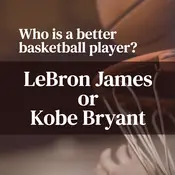
Basketball fans and experts are passionately debating who is the better player—Kobe Bryant or LeBron James. Although one's personal opinions are important, analyzing their accomplishments, statistics, and court impact provides unique insights into this interesting comparison.
Kobe Bryant, who is frequently praised for his scoring ability and five championship rings, had the honor of playing a significant role in the Lakers' dynastic run, displaying a variety of talents that won him the respect of supporters everywhere. LeBron James is an athletic and versatile player whose playmaking, scoring, and defense are all above average. He has had a significant impact on the game in many ways.
LeBron has three championship rings compared to Kobe's five, which could indicate an advantage. But a closer look reveals the background. Kobe won his first three championships as a secondary contributor, sharing the first three with Shaquille O'Neal. LeBron, on the other hand, added weight to his ring contributions by leading his teams as the alpha.
In several areas, LeBron outperforms Kobe statistically. In terms of scoring, passing, and grabbing rebounds, he is more efficient. His performances in the Finals show that he has increased consistency and versatility in his overall game. Plus-minus metrics make LeBron's contribution to the team appear more substantial because they show that his teams perform better when he is on the court and worse when he is not.
Kobe, who is well-known for his skillful scoring and clutch plays, left a lasting legacy thanks to his extraordinary skills and guidance. His basketball intelligence and defensive prowess were crucial, frequently cited as the main factors in the Lakers' success during his tenure.
The Kobe-LeBron controversy touches on a number of topics, such as athleticism, leadership, clutch situations, and their effects on the game. While LeBron's versatility, statistical dominance, and overall impact make a strong case for him, Kobe's scoring prowess and multiple championships remain unwavering pillars.
It's clear from ongoing discussions and shifting viewpoints that there won't be a clear winner in this debate between these two basketball legends, which reflects the variety of factors influencing people's perceptions as well as the dynamic nature of the sport.
Kobe Bryant, who is frequently praised for his scoring ability and five championship rings, had the honor of playing a significant role in the Lakers' dynastic run, displaying a variety of talents that won him the respect of supporters everywhere. LeBron James is an athletic and versatile player whose playmaking, scoring, and defense are all above average. He has had a significant impact on the game in many ways.
LeBron has three championship rings compared to Kobe's five, which could indicate an advantage. But a closer look reveals the background. Kobe won his first three championships as a secondary contributor, sharing the first three with Shaquille O'Neal. LeBron, on the other hand, added weight to his ring contributions by leading his teams as the alpha.
In several areas, LeBron outperforms Kobe statistically. In terms of scoring, passing, and grabbing rebounds, he is more efficient. His performances in the Finals show that he has increased consistency and versatility in his overall game. Plus-minus metrics make LeBron's contribution to the team appear more substantial because they show that his teams perform better when he is on the court and worse when he is not.
Kobe, who is well-known for his skillful scoring and clutch plays, left a lasting legacy thanks to his extraordinary skills and guidance. His basketball intelligence and defensive prowess were crucial, frequently cited as the main factors in the Lakers' success during his tenure.
The Kobe-LeBron controversy touches on a number of topics, such as athleticism, leadership, clutch situations, and their effects on the game. While LeBron's versatility, statistical dominance, and overall impact make a strong case for him, Kobe's scoring prowess and multiple championships remain unwavering pillars.
It's clear from ongoing discussions and shifting viewpoints that there won't be a clear winner in this debate between these two basketball legends, which reflects the variety of factors influencing people's perceptions as well as the dynamic nature of the sport.
 RSS Feed
RSS Feed
